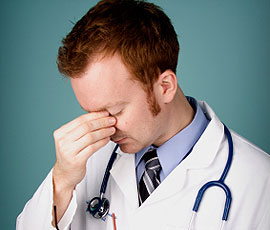
June 4th, 2010 by Toni Brayer, M.D. in Better Health Network, Health Policy, Health Tips, News, Opinion, Research, True Stories
Tags: Clinical Educators, Deadly Medication Mistakes, Family Practice, Hospital Admissions, Journal of General Internal Medicine, Medical Errors, Medical School Students, Medical Training, New Medical Interns, New Medical Residents, Patient Safety, Pharmacology, Primary Care, Protecting Patients, Teaching Hospitals, The July Effect, Young Doctors
No Comments »

 From Dr. Toni Brayer at Everything Health:
From Dr. Toni Brayer at Everything Health:
We medical folks have always known that July is the worst time for a patient to be admitted to the hospital. It has nothing to do with nice summer weather or staff vacations. Although it cannot be proven, we think the answer to the mystery of July hospital errors is human — yes, it’s the new interns.
A new study published in the June issue of the Journal of General Internal Medicine looked at all U.S. death certificates from 1979 to 2006. They found that in teaching hospitals, on average deadly medication mistakes surged by 10 percent each July. The good news is they did not find a surge in other medical errors, including surgery or in non-teaching hospitals. Read more »
*This blog post was originally published at ACP Internist*
June 3rd, 2010 by Medgadget in Better Health Network, Health Tips, Research
Tags: ACS Nano, Automatic Glucose Readings, Continuous Glucose Readings, Department of Chemical Engineering, Diabetes, Diabetes Management, Diabetes Technology, Diabetes Tools, Dr. Michael Strano, Dr. Paul Barone, Endocrinology, Glucose Control, Glucose Management, Glucose Meter, Glucose Monitoring, Glucose Sensor, Internal Medicine, MIT, Nano-Tattoo, Nanoparticle, Track Blood Sugar
No Comments »

 Millions of people with diabetes are forced to endure multiple finger pricks daily — an unpleasant practice that may impede compliance, and whose reliability is operator-dependent.
Millions of people with diabetes are forced to endure multiple finger pricks daily — an unpleasant practice that may impede compliance, and whose reliability is operator-dependent.
Now, Dr. Paul Barone and Dr. Michael Strano at the MIT Department of Chemical Engineering are developing a new approach to glucose monitoring.
Building on work they previously published in ACS Nano, the new technology employs a nanoparticle “tattoo” as a glucose sensor, which can then be continuously monitored by a device on the surface of the body. Read more »
*This blog post was originally published at Medgadget*
June 1st, 2010 by Toni Brayer, M.D. in Better Health Network, Health Tips, News, Opinion, Research
Tags: American Society of Clinical Oncology, Breast Cancer, CAM, Cancer Diagnosis, Cancer Survivors, Cancer Treatment, Community and Preventive Medicine, Complementary And Alternative Medicine, Daytime Sleepiness, Diagnosed With Cancer, Diaster Relief Medical Care, Dr. Karen Mustian, Fatigue, Grace Cheng, Haiti, Nurse Volunteer, Radiation Oncology, RN, Sleep Aid, Sleep Apnea, Sleep Disturbance, Sleep Medication, Sleep Medicine, Sleep Quality, Sleeplessness, University of Rochester-New York, Yoga
No Comments »

 People who’ve been diagnosed cancer can be heartened by the results of a study that will be presented June 5 at the upcoming American Society of Clinical Oncology annual meeting. The researchers found that the practice of yoga helped cancer survivors improve sleep quality and reduce fatigue.
People who’ve been diagnosed cancer can be heartened by the results of a study that will be presented June 5 at the upcoming American Society of Clinical Oncology annual meeting. The researchers found that the practice of yoga helped cancer survivors improve sleep quality and reduce fatigue.
The lead researcher, Dr. Karen Mustian, professor of Radiation Oncology and Community and Preventive Medicine at the University of Rochester in New York, followed 410 patients who had already completed treatment for cancer but who experienced sleep disturbance that required medication. Read more »
*This blog post was originally published at EverythingHealth*
May 30th, 2010 by BarbaraFicarraRN in Better Health Network, Health Tips
Tags: Active Children, Backyard Play, Bump On The Head, Childhood, Childhood Development, Consent-To-Treat Form, Creative Thinking, Emotional Growth, Family Medicine, General Medicine, Healthy Kids, Intellectual Growth, List Of Medications, Little Mishaps, Make Believe, Medical History Form, Minor Injuries, Outdoor Fun For Kids, Outdoor Play, Outdoors Games, Pediatrics, Physical Exercise, Playing Outdoors, Primary Care, Recess
No Comments »

 “Play, Incorporating Animistic and Magical Thinking Is Important Because It: Fosters the healthy, creative and emotional growth of a child; Forms the best foundation for later intellectual growth. Provides a way in which children get to know the world and creates possibilities for different ways of responding to it. Fosters empathy and wonder.” — Rachel Carson, “A Sense of Wonder”
“Play, Incorporating Animistic and Magical Thinking Is Important Because It: Fosters the healthy, creative and emotional growth of a child; Forms the best foundation for later intellectual growth. Provides a way in which children get to know the world and creates possibilities for different ways of responding to it. Fosters empathy and wonder.” — Rachel Carson, “A Sense of Wonder”
Remember “Red Light, Green Light,” “One-Two-Three,” “Tag, You’re It,” “Mother, May I?” or “Kickball?” These are just some of the good old-fashioned outdoor games kids used to play, and they are making a comeback. There’s nothing better than the sound of kids playing outdoors. Even kids playing outside making up their own games can bring them a lot joy and can be great exercise. With all the technology that surrounds us today, it’s great to see kids playing in the park and in their backyards.
It’s no secret that outdoor play and fresh air are great for kids’ overall physical and emotional well-being. In fact, a study in the journal Pediatrics concludes that children ages 8 and 9 who had more than 15 minutes of recess had better classroom behavior. This study suggests that school children in this age group should be provided with daily recess. Read more »
*This blog post was originally published at Health in 30*
May 29th, 2010 by Gwenn Schurgin O'Keeffe, M.D. in Better Health Network, Health Tips, Opinion, True Stories
Tags: Advice For Parents, Andy Rooney, Career Choice, Career Path, CBS News, Childhood, College Education, College Students, College Years, Family Medicine, High School Graduates, High School Seniors, High Schoolers, Life Choice, Life Transition, Life's Amibitions, New Independence, Parenting, Parenting Behavior, Personal Choices, Quality Education, Rite Of Passage, Teenagers, teens, Young Adults
No Comments »

 It’s here again: High school graduation season — that annual rite of passage for high schoolers coast to coast to embark upon that much-anticipated journey from home to that first true independent step outside the safety net of their childhood communities.
It’s here again: High school graduation season — that annual rite of passage for high schoolers coast to coast to embark upon that much-anticipated journey from home to that first true independent step outside the safety net of their childhood communities.
What always amazes me is the pressure high school kids feel as they embark upon this journey and how often I hear these kids express anxiety over not knowing what they want to be “when they grow up.” And, let’s not forget that we are still talking about kids — these are still teenagers, still developing and maturing. Read more »
*This blog post was originally published at Dr. Gwenn Is In*
 From Dr. Toni Brayer at Everything Health:
From Dr. Toni Brayer at Everything Health:




 Millions of people with diabetes are forced to endure multiple finger pricks daily — an unpleasant practice that may impede compliance, and whose reliability is operator-dependent.
Millions of people with diabetes are forced to endure multiple finger pricks daily — an unpleasant practice that may impede compliance, and whose reliability is operator-dependent.

 “Play, Incorporating Animistic and Magical Thinking Is Important Because It: Fosters the healthy, creative and emotional growth of a child; Forms the best foundation for later intellectual growth. Provides a way in which children get to know the world and creates possibilities for different ways of responding to it. Fosters empathy and wonder.” — Rachel Carson, “
“Play, Incorporating Animistic and Magical Thinking Is Important Because It: Fosters the healthy, creative and emotional growth of a child; Forms the best foundation for later intellectual growth. Provides a way in which children get to know the world and creates possibilities for different ways of responding to it. Fosters empathy and wonder.” — Rachel Carson, “
 It’s here again: High school graduation season — that annual rite of passage for high schoolers coast to coast to embark upon that much-anticipated journey from home to that first true independent step outside the safety net of their childhood communities.
It’s here again: High school graduation season — that annual rite of passage for high schoolers coast to coast to embark upon that much-anticipated journey from home to that first true independent step outside the safety net of their childhood communities.







